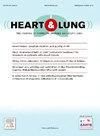心血管-肾-代谢综合征晚期与发生慢性肺病风险的关联:来自全国前瞻性队列研究的证据
IF 2.6
4区 医学
Q2 CARDIAC & CARDIOVASCULAR SYSTEMS
引用次数: 0
摘要
背景心血管-肾-代谢综合征(CKM)与慢性肺部疾病(CLD)之间的关系尚未得到详细阐述。目的探讨CKM晚期与发生CLD风险之间的关系,并探讨炎症在这一关系中的潜在介导作用。方法本研究分析2011 - 2018年中国健康与退休纵向研究(CHARLS)的数据。采用Cox回归模型评估不同阶段CKM与CLD之间的关系。采用中介分析来评估高敏c反应蛋白(hsCRP)在CKM-CLD关系中的作用。结果我们的研究结果表明,在校正混杂因素后,CKM 3期(HR = 2.215, 95% CI: 1.202-4.082)和4期(HR = 3.231, 95% CI: 1.743-5.990)与慢性肺部疾病(CLD)发生风险增加显著相关。Kaplan-Meier生存分析显示,CKM 3-4期患者的CLD发生率高于0-2期患者(HR = 1.662, 95% CI: 1.441-1.917, P <;0.001)。中介分析进一步表明,hsCRP水平部分介导CKM与呼气峰流量(PEF)之间的关系,占2.25%的影响(95% CI: 0.42% -5.00 %, p = 0.022)。结论CKM晚期,特别是3期和4期,与CLD发生风险增加显著相关。认识和管理CKM作为一个多方面的综合征是至关重要的,它超越了心血管、代谢和肾脏系统,影响呼吸系统健康。本文章由计算机程序翻译,如有差异,请以英文原文为准。
Association of advanced stages of Cardiovascular-kidney-metabolic syndrome with the risk of developing chronic lung disease: evidence from a nationwide prospective cohort study
Background
The relationship between Cardiovascular-Kidney-Metabolic syndrome (CKM) and Chronic Lung Disease (CLD) has not been elaborated.
Objectives
To investigate the associations between advanced stages of CKM and the risk of developing CLD, and to explore the potential mediating role of inflammation in this relationship.
Methods
This study analyzed data from the China Health and Retirement Longitudinal Study (CHARLS) from 2011 to 2018. Cox regression models were used to assess the relationships between different stages of CKM and CLD. Mediation analysis was performed to assess the role of high-sensitivity C-reactive protein (hsCRP) in the CKM-CLD relationship.
Results
Our findings demonstrated that, after adjustment for confounding factors, CKM Stage 3 (HR = 2.215, 95 % CI: 1.202–4.082) and Stage 4 (HR = 3.231, 95 % CI: 1.743–5.990) were significantly associated with an increased risk of developing chronic lung disease (CLD). Kaplan-Meier survival analysis indicated that participants at CKM Stages 3–4 had a higher incidence of CLD compared to those at Stages 0–2 (HR = 1.662, 95 % CI: 1.441–1.917, P < 0.001). Mediation analysis further suggested that hsCRP levels partially mediated the relationship between CKM and peak expiratory flow (PEF), accounting for 2.25 % of the effect (95 % CI: 0.42 % -5.00 %, p = 0.022).
Conclusion
Advanced stages of CKM, specifically stages 3 and 4, are significantly associated with an increased risk of developing CLD. It is critical to recognize and manage CKM as a multifaceted syndrome that extends beyond the cardiovascular, metabolic, and renal systems to impact respiratory health.
求助全文
通过发布文献求助,成功后即可免费获取论文全文。
去求助
来源期刊

Heart & Lung
医学-呼吸系统
CiteScore
4.60
自引率
3.60%
发文量
184
审稿时长
35 days
期刊介绍:
Heart & Lung: The Journal of Cardiopulmonary and Acute Care, the official publication of The American Association of Heart Failure Nurses, presents original, peer-reviewed articles on techniques, advances, investigations, and observations related to the care of patients with acute and critical illness and patients with chronic cardiac or pulmonary disorders.
The Journal''s acute care articles focus on the care of hospitalized patients, including those in the critical and acute care settings. Because most patients who are hospitalized in acute and critical care settings have chronic conditions, we are also interested in the chronically critically ill, the care of patients with chronic cardiopulmonary disorders, their rehabilitation, and disease prevention. The Journal''s heart failure articles focus on all aspects of the care of patients with this condition. Manuscripts that are relevant to populations across the human lifespan are welcome.
 求助内容:
求助内容: 应助结果提醒方式:
应助结果提醒方式:


